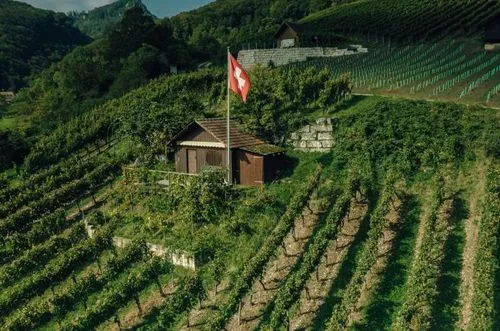Müller-Thurgau

Grape variety White
Serving temperature:
8-10°C
Profile Müller-Thurgau
White grape variety
Area planted with vines in Switzerland: 425 hectares
Other names: Riesling-Silvaner, Rivaner
The taste of Müller-Thurgau
The Müller-Thurgau grape produces fresh, fruity wines with a delicate flavour. It typically offers green apple, citrus and floral notes, accompanied by a pleasant, refreshing acidity. Slightly spicy or herbaceous nuances are also often present. The wines tend to be light and uncomplicated, making them popular everyday wines.
Müller-Thurgau goes well with these dishes
Müller-Thurgau goes particularly well with fish, such as trout, zander or whitefish, and with seafood, especially prawns, mussels and shellfish. It is also an excellent choice for poultry dishes.
Its fruity freshness goes well with salads, Asian dishes and lightly flavoured dishes. It also goes well with mild cheeses such as goat cheese or cream cheese. Thanks to its lightness, Müller-Thurgau is ideal for social occasions and as an aperitif.
History and cultivation of Müller-Thurgau
For a long time, the Müller-Thurgau variety was wrongly considered to be an artificial cross between Riesling and Silvaner, created in Germany in 1882 by Dr Hermann Müller from Thurgau. However, DNA analyses conducted in 2000 revealed that it is actually a cross between Riesling and Madeleine Royale. Nevertheless, the incorrect name Riesling-Silvaner was retained in Switzerland.
Müller-Thurgau thrives best in temperate climates and on fertile, well aired soils.
Distribution of Müller-Thurgau in Switzerland
In Switzerland, Müller-Thurgau is cultivated in all wine-growing regions. The vine is particularly widespread in Thurgau, Aargau and Graubünden.
Distribution of grape varieties
Müller-Thurgau is grown in several wine regions
91%
3%
3%
1%
1%
0%
FAQ: Frequently asked questions about the Müller-Thurgau grape variety
The wine is named after its selector, Dr Hermann Müller of Thurgau. Dr. Müller was a Swiss wine scientist who bred the Müller-Thurgau vine in Geisenheim (Germany) in 1882. The name “Thurgau” refers to its region of origin.
Actually, they are two names for the same wine. But there are subtle nuances in flavour: while Müller-Thurgau is known for its spicy (muscat) notes, Rivaner is often dominated by very fresh, green fruit flavours.
To visit our site, you must be of legal drinking age in your country of residence.




